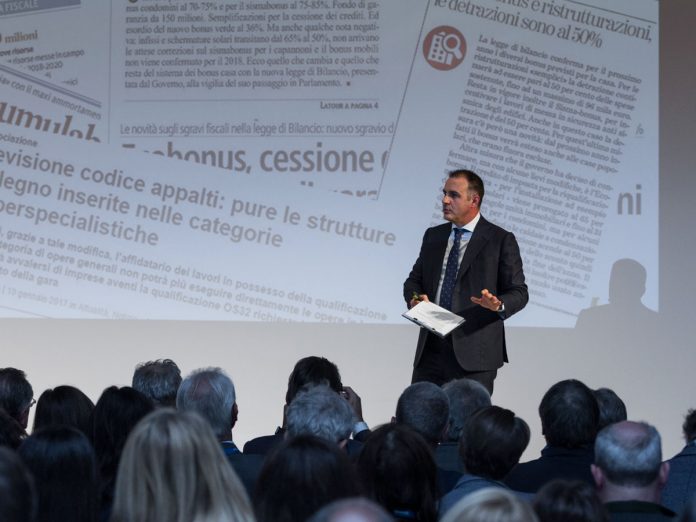It’s official: the Salone del Mobile has been postponed to 2021. What reactions have you had from companies? What are the most widespread concerns?
The concerns of our companies are the same as those of the entire business world at the moment. At the top of the list there is definitely the crisis of liquidity. We don’t issue invoices, we don’t have income, but we have to pay taxes and, wherever possible, we have to pay our suppliers (especially the small ones) in an attempt to keep the chain of activity alive. We have to think about human capital, which is fundamental for us. We need immediate unemployment measures, but above all we need liquidity and a vision of the future.
What will be the effects of this shift on businesses and the market?
A lot will depend on how long the crisis lasts and how many companies will have to still be closed. We have already gotten past the month of March, but I don’t know if we can get through April. Our sector is already reporting a 20% drop in sales. We have to be aware that other countries will not just stay on the sidelines, and will be trying to take over our market share. Made in Italy, as soon as possible, has to regain its status, for our sector and around the world.
The biennials held in the same year, together with Workplace 3.0, S.Project, SaloneSatellite, the section on bathroom furnishings… will there be enough space for all this at the fair?
I think the 2021 edition, the 60th to be precise, will be a moment of rebirth and the desire to show the whole world what we are capable of doing, so space will be the last of our problems.
Since the official announcement, there have been many proposals for a virtual FuoriSalone, separate from the fair. What do you think?
I believe that in this moment we have to think about other things, concentrating on how to get out of this emergency in terms of health and economics. The FuoriSalone has always been an event that goes hand in hand with the Salone; together, during the design week, they make Milan the city watched by all eyes around the world. In any case, I am used to being very pragmatic and on reasoning about facts, while at the moment there are simply many proposals. So we shall see.
In the light of the new restrictions in the Cura Italia legislation, imposing closure of non-indispensable production, what is the situation of the furniture/design industry?
From the outset we have said that it is necessary to reconcile health and work. Where that is not possible, we have interrupted production, as is only fitting. Part of our business chain – packing and packaging, for example – is still operative because it operates with production that cannot be delayed. Otherwise we are at a standstill. We should consider the fact that half of our sales are from abroad, and at the moment foreign countries are light years away.
Do you already have figures that can give us a snapshot of the economic impact?
We cannot make precise estimates, but I repeat that to date we have 20% less sales, which with annual sales of 42.5 billion euros is a big blow. For every billion of decreased sales, we have the risk of a loss of about 8000 jobs. Not a cheerful outlook…
Who is hurt most?
When the emergency had not yet exploded, the worst hit were undoubtedly the installers that are part of FederlegnoArredo, such as ASAL. Already with the initial postponement of a few months of the most important national and international fairs, this segment was hitting bottom. Today, unfortunately, they have been joined by nearly all the other segments, with the exception of those that continue to operate, such as packing-packaging.
At the moment the level of worry is very high. Companies might be able to make it, if production resumes soon. But the furniture industry depends above all on retail and contract, so there are many sectors that have to recover, not just ours. In case the message isn’t clear, what we need are ample injections of liquidity, so that the machine can start operating again in spite of the fact that it has been stopped.
What are the critical points of the Cura Italia decree?
The critical aspect is not thinking sufficiently about bringing liquidity to companies and families. Where some thinking has been done, the procedures are so complicated and unwieldy that they are impossible to carry out. It is also indispensable to freeze the rating system; the scheduling of debt has to be extended, because without income payments cannot be made at month’s end. The criteria of amortization have to be revised, and an income support system has to be put in place for employees who are currently out of work. Without these measures we will not be ready to resume activities.
There has been controversy about the timing of communications of postponements of taxes. They arrived too late, when the payments had already been made.
I was clear about this, at the time: delaying payment of taxes by just four days in a condition of worldwide emergency is simply a bad joke.
You have made your position known to the institutions… has there been any response?
Of course, even before the emergency exploded in its present forms. In Rome we have met with institutions and ministers, bringing the issues of our sector to their attention. I can say that some of our proposals were well received, but unfortunately the progress of the situation is such that a true shock is now needed, involving immediate economic measures to sustain companies and families. Otherwise the system will implode.
How is the Federation taking steps? What is the strategy of FLA for the short term and the long term?
The Federation immediately took steps, through a task force and in direct interaction with our entrepreneurs, to help them in this difficult moment, providing them with a newsletter every evening in which to find all the useful information and updates to come to grips with this very complicated phase. We are in daily contact to understand their needs, and on the basis of their feedback we develop proposals. Many non-members are also turning to us and asking for support, and this is a signal that we are moving in the right direction.
What is the strong point of Italian businesses to get past the crisis, and what lesson should be learned and applied?
We undoubtedly have to learn that nothing can be taken for granted, that the world can change in an instant. Our companies, nevertheless, have a great ability to reinvent themselves; just consider the fact that the large fashion brands have converted their production to create medical smocks and masks. We are known around the world for the quality of our products, and our peerless craftsmanship. Made in Italy has to once again be our banner in the world. Not only for our sector, but for the entire country.







